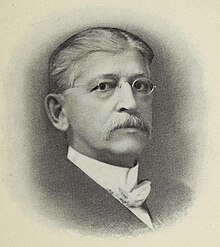Aaron T. Bliss
Aaron Thomas Bliss (born May 22, 1837 in Peterboro , Madison County , New York , † September 16, 1906 in Milwaukee , Wisconsin ) was an American politician and the 25th Governor of Michigan from 1901 to 1905 .
Early years
Aaron Bliss attended local schools in his home country. He then worked from 1854 to 1855 in a shop in Morrisville, New York State. A year later he moved to Bouckville , where he worked in commerce. During the American Civil War he was a member of a New York cavalry regiment . There he made it to the captain . He took part in a few battles. Similar to his predecessor as governor of Michigan, Hazen Pingree , he became a prisoner of war . He also managed to escape from a Confederate prison camp .
After the war, Bliss moved to Saginaw , Michigan. There he ran a sawmill. Together with his brother Lyman Bliss and another partner, he founded AT Bliss Co , a company that specialized primarily in the timber business on the Tobacco River . In 1880, Bliss was a co-founder of Citizens National Bank . He later served as President of the Saginaw County Savings Bank .
Political career
In 1882, Aaron Bliss was elected to the Michigan Senate for one term . He was then a member of the advisory board of Governor Russell Alexander Alger . Bliss also held a leading position with the Grand Army of the Republic (GAR), a veterans' association of soldiers in the Union Army . Between 1889 and 1891 he represented his state in the US House of Representatives . After the end of his time in Congress, he first returned to his business and the GAR before he was elected as the new governor of his state as a candidate of the Republican Party in 1900 . Here he was able to prevail against his democratic opponent, the Detroit mayor William C. Maybury .
Michigan governor
Bliss took up his new office on January 1, 1901. After re-election in 1902, he could remain in office until January 1, 1905. During this time a Highway Department was established. A home for war veterans was established in Grand Rapids and a law to tax railway companies came into effect. An asylum for the blind was also built in Saginaw.
Further life
After the end of his tenure, Bliss withdrew from politics and died in September 1906 in Milwaukee, where he had gone for medical treatment. Aaron Bliss was married to Allaseba Phelps and was buried in Saginaw.
literature
- Robert Sobel and John Raimo (Eds.): Biographical Directory of the Governors of the United States, 1789–1978. Volume 2, Meckler Books, Westport, 1978. 4 volumes.
Web links
- Aaron T. Bliss in the Biographical Directory of the United States Congress (English)
- Aaron Bliss at the National Governors Association (English)
- Aaron T. Bliss in the database of Find a Grave (English)
| personal data | |
|---|---|
| SURNAME | Bliss, Aaron T. |
| ALTERNATIVE NAMES | Bliss, Aaron Thomas (full name) |
| BRIEF DESCRIPTION | American politician, governor of Michigan |
| DATE OF BIRTH | May 22, 1837 |
| PLACE OF BIRTH | Peterboro , New York |
| DATE OF DEATH | September 16, 1906 |
| Place of death | Milwaukee , Wisconsin |


